最新高三英语阅读理解(人物故事)试题类型及其解题技巧及解析
最新高三英语阅读理解(人物故事)试题类型及其解题技巧含解析
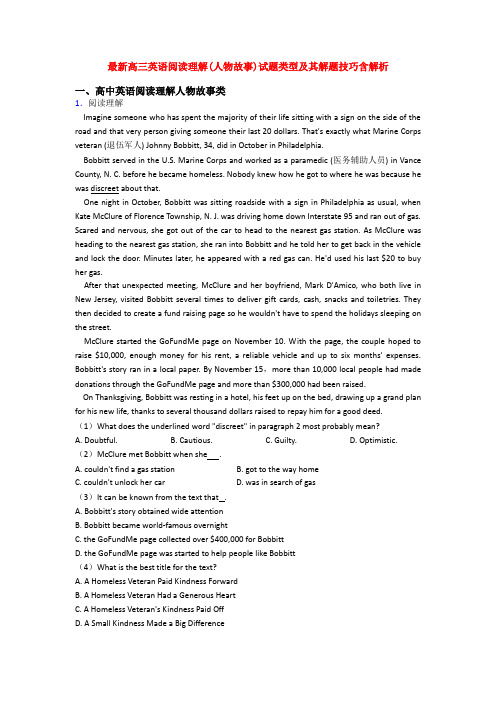
最新高三英语阅读理解(人物故事)试题类型及其解题技巧含解析一、高中英语阅读理解人物故事类1.阅读理解Imagine someone who has spent the majority of their life sitting with a sign on the side of the road and that very person giving someone their last 20 dollars. That's exactly what Marine Corps veteran (退伍军人) Johnny Bobbitt, 34, did in October in Philadelphia.Bobbitt served in the U.S. Marine Corps and worked as a paramedic (医务辅助人员) in Vance County, N. C. before he became homeless. Nobody knew how he got to where he was because he was discreet about that.One night in October, Bobbitt was sitting roadside with a sign in Philadelphia as usual, when Kate McClure of Florence Township, N. J. was driving home down Interstate 95 and ran out of gas. Scared and nervous, she got out of the car to head to the nearest gas station. As McClure was heading to the nearest gas station, she ran into Bobbitt and he told her to get back in the vehicle and lock the door. Minutes later, he appeared with a red gas can. He'd used his last $20 to buy her gas.After that unexpected meeting, McClure and her boyfriend, Mark D'Amico, who both live in New Jersey, visited Bobbitt several times to deliver gift cards, cash, snacks and toiletries. They then decided to create a fund raising page so he wouldn't have to spend the holidays sleeping on the street.McClure started the GoFundMe page on November 10. With the page, the couple hoped to raise $10,000, enough money for his rent, a reliable vehicle and up to six months' expenses. Bobbitt's story ran in a local paper. By November 15,more than 10,000 local people had made donations through the GoFundMe page and more than $300,000 had been raised.On Thanksgiving, Bobbitt was resting in a hotel, his feet up on the bed, drawing up a grand plan for his new life, thanks to several thousand dollars raised to repay him for a good deed.(1)What does the underlined word "discreet" in paragraph 2 most probably mean?A. Doubtful.B. Cautious.C. Guilty.D. Optimistic.(2)McClure met Bobbitt when she .A. couldn't find a gas stationB. got to the way homeC. couldn't unlock her carD. was in search of gas(3)It can be known from the text that .A. Bobbitt's story obtained wide attentionB. Bobbitt became world-famous overnightC. the GoFundMe page collected over $400,000 for BobbittD. the GoFundMe page was started to help people like Bobbitt(4)What is the best title for the text?A. A Homeless Veteran Paid Kindness ForwardB. A Homeless Veteran Had a Generous HeartC. A Homeless Veteran's Kindness Paid OffD. A Small Kindness Made a Big Difference【答案】(1)B(2)D(3)A(4)C【解析】【分析】本文是一篇记叙文,—个无家可归的退伍军人将身上仅有的二十美元买了汽油送给在回家途中汽车没油的年轻女子,事后这名女子和她的男朋友专门建了一个网页为他募捐,使他不用再睡在大街上。
高三英语阅读理解(人物故事)常见题型及答题技巧及练习题(含答案)含解析

高三英语阅读理解(人物故事)常见题型及答题技巧及练习题(含答案)含解析一、高中英语阅读理解人物故事类1.阅读理解On a recent trip to the island of Newfoundland, Canada, my husband asked our talkative cab driver what made him most proud to be from there."Our generosity and hospitality (好客)," he replied in a strong local accent. "Your car breaks down in the middle of nowhere, someone will stop to help. People here are kind like that."His answer lingered in my mind during that ride with my husband and teenage kids, as we headed out to explore on the first day of our vacation.Little did I know we were about to experience some of that remarkable Newfoundland kindness for ourselves.We met Alma that same morning at the start of a long hike.Our teenagers hurried ahead, and as we walked behind, admiring the scenery, two women in sunglasses and summer hiking gear stopped.They'd heard us discussing different routes, then asked if we'd like suggestions.They looked to be in their 40s, and were both enthusiastic to share their local expertise.We listened eagerly, taking mental notes, until one of the women asked, "You have a car, right?"I explained that there were no cars available during our week on the island, so we had to rely on cabs instead."Oh no," she said, "you need a car." And then, as casually as if offering a piece of chewing gum (口香糖), she said: "Take mine!"Dumbfounded, my husband and I just smiled in disbelief."Why not?" She insisted. "You need a car to get to know all these places.""But you don't even know us," I said."That doesn't matter," she continued with absolute determination.Stunned, I looked over at her friend, who shrugged and said, "That's Alma."Forty minutes of talking later, my family climbed into Alma's car.We spent the rest of our vacation discovering different areas of this beautiful island.But it wasn't the groups of whales we saw, or the vast areas of woodland, that made this place so memorable.Instead, it was the act of kindness from a complete stranger that made us realize how special Newfoundland really was.Next year, there's no doubt where we'll be taking our summer vacation. Who knows what act of kindness we'll meet then?(1)What problem did the author's family have in Newfoundland?A.They couldn't understand the local accent.B.Their car broke down on the first day.C.They got lost during a hike.D.They didn't have a car.(2)The underlined word "dumbfounded" in Paragraph 12 is closest in meaning to ______.A.shockedB.satisfiedC.relievedD.embarrassed(3)What impressed the author most during her stay in Newfoundland?A.The talkative cab driver.B.The whales swimming.C.The beautiful scenery of the island.D.The help from an enthusiastic stranger.(4)What can we infer about the author from the last paragraph?A.She is looking forward to meeting Alma once more.B.She expects to visit Newfoundland again.C.She hasn't decided where to go next year.D.She also wants to be kind to others during vacation.【答案】(1)D(2)A(3)D(4)B【解析】【分析】本文是一篇记叙文,作者最近一次去加拿大的纽芬兰旅行时,被当地人的热情好客深深触动。
高三英语阅读理解(人物故事)及其解题技巧及练习题(含答案)含解析

高三英语阅读理解(人物故事)及其解题技巧及练习题(含答案)含解析一、高中英语阅读理解人物故事类1.阅读理解When I was 12 years old, I already knew that my teen years were going to be the worst years of my life. I was a total outsider, bullied (欺凌) at school. I felt completely alone in my small town.But by starting to do volunteer work when I was 14, I turned my problem into a passion for helping others. The opportunity to practice kindness made me feel like my life had a greater purpose. The more positive energy I shared, the more kindness and appreciation I received. I realized that my purpose in life would be to reach out to people, specifically teenagers, and help them feel less alone.Books were my true friends back then. I was so thankful that the authors wrote those books. The kindness they offered me with their books saved my life. One of my biggest dreams was to become an author so I could write books that would help other teenagers the way those books helped me.After surviving terrible experiences at school and at home, I made a choice to take the optimistic, positive road in the next steps of my journey. My dream career, one I thought was only possible for the authors I loved, is what I am doing now. I have been a full-time author of teen novels since 2007 and am grateful for this amazing opportunity to reach out to readers every single day.Kindness saved me when I needed help the most. Even small acts of kindness can change someone's life. You never know what someone else is going through. But by practicing daily kindness, you become an architect of positive change.(1)What was the author's life like when he was 12?A.Boring.B.Peaceful.C.Unhappy.D.Meaningful.(2)How did the volunteer work benefit the author?A.It made him popular in his town.B.It helped him find the meaning of life.C.It helped him understand others' lives better.D.It helped to shape his dream career.(3)Why did the author choose writing as his job?A.He was inspired by his teacher.B.He could pass positive energy to readers.C.He wanted to share his school experiences.D.He found he had a talent for writing.(4)What does the author suggest readers do in the last paragraph?A.Say 'no' to bullies bravely.B.Make positive changes in their lives.C.Treat others with kindness in daily life.D.Learn to care more about others' feelings.【答案】(1)C(2)B(3)B(4)C【解析】【分析】本文是一篇记叙文,作者讲述了自己参加志愿活动的经历,告诉人们:一次小善举也可能改变一个人的一生。
【英语】高三英语阅读理解(人物故事)解题技巧及经典题型及练习题(含答案)及解析
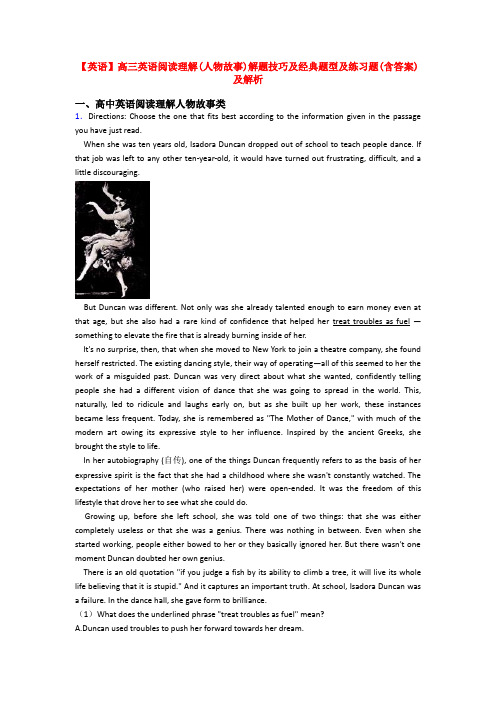
【英语】高三英语阅读理解(人物故事)解题技巧及经典题型及练习题(含答案)及解析一、高中英语阅读理解人物故事类1.Directions: Choose the one that fits best according to the information given in the passage you have just read.When she was ten years old, Isadora Duncan dropped out of school to teach people dance. If that job was left to any other ten-year-old, it would have turned out frustrating, difficult, and a little discouraging.But Duncan was different. Not only was she already talented enough to earn money even at that age, but she also had a rare kind of confidence that helped her treat troubles as fuel —something to elevate the fire that is already burning inside of her.It's no surprise, then, that when she moved to New York to join a theatre company, she found herself restricted. The existing dancing style, their way of operating—all of this seemed to her the work of a misguided past. Duncan was very direct about what she wanted, confidently telling people she had a different vision of dance that she was going to spread in the world. This, naturally, led to ridicule and laughs early on, but as she built up her work, these instances became less frequent. Today, she is remembered as "The Mother of Dance," with much of the modern art owing its expressive style to her influence. Inspired by the ancient Greeks, she brought the style to life.In her autobiography (自传), one of the things Duncan frequently refers to as the basis of her expressive spirit is the fact that she had a childhood where she wasn't constantly watched. The expectations of her mother (who raised her) were open-ended. It was the freedom of this lifestyle that drove her to see what she could do.Growing up, before she left school, she was told one of two things: that she was either completely useless or that she was a genius. There was nothing in between. Even when she started working, people either bowed to her or they basically ignored her. But there wasn't one moment Duncan doubted her own genius.There is an old quotation "if you judge a fish by its ability to climb a tree, it will live its whole life believing that it is stupid." And it captures an important truth. At school, Isadora Duncan was a failure. In the dance hall, she gave form to brilliance.(1)What does the underlined phrase "treat troubles as fuel" mean?A.Duncan used troubles to push her forward towards her dream.B.Duncan was good at burning away everyday troubles.C.Troubles turned Duncan into a confident girl.D.Troubles lit the fire of dancing in Duncan.(2)Which of the following is TRUE about Duncan?A.Her experience in New York was the foundation of her career.B.Her teaching job when she was little destroyed her confidence.C.Her dancing style was not very well received at the beginning.D.Her mother set higher expectation on her than she could bear.(3)What does the author try to tell the readers in the last paragraph?A.It is useless climbing a tree to catch fish.B.Everybody is a genius in his own way.C.Miseries come from human stupidity.D.Teachers can impact students greatly.(4)What is this passage mainly about?A.Isadora Duncan's childhood and her achievements today.B.Duncan's career development and other dancers' opinions of her.C.Isadora Duncan's early experiences and the reasons for her success.D.Duncan's high status in the dancing world and her unique expressive style.【答案】(1)A(2)C(3)B(4)C【解析】【分析】本文是一篇记叙文,伊莎多拉·邓肯十岁时辍学去教别人跳舞,作者讲述了她的早期的经历以及其取得成功的原因。
最新高考英语高中英语阅读理解(人物故事)常见题型及答题技巧及练习题(含答案)
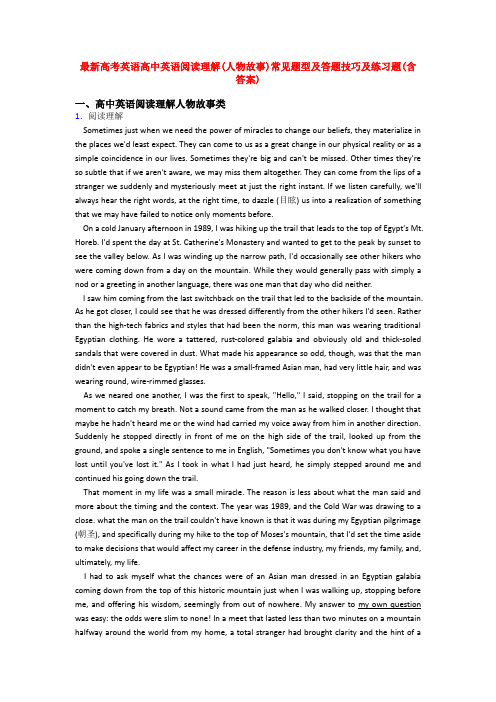
最新高考英语高中英语阅读理解(人物故事)常见题型及答题技巧及练习题(含答案)一、高中英语阅读理解人物故事类1.阅读理解Sometimes just when we need the power of miracles to change our beliefs, they materialize in the places we'd least expect. They can come to us as a great change in our physical reality or as a simple coincidence in our lives. Sometimes they're big and can't be missed. Other times they're so subtle that if we aren't aware, we may miss them altogether. They can come from the lips of a stranger we suddenly and mysteriously meet at just the right instant. If we listen carefully, we'll always hear the right words, at the right time, to dazzle (目眩) us into a realization of something that we may have failed to notice only moments before.On a cold January afternoon in 1989, I was hiking up the trail that leads to the top of Egypt's Mt. Horeb. I'd spent the day at St. Catherine's Monastery and wanted to get to the peak by sunset to see the valley below. As I was winding up the narrow path, I'd occasionally see other hikers who were coming down from a day on the mountain. While they would generally pass with simply a nod or a greeting in another language, there was one man that day who did neither.I saw him coming from the last switchback on the trail that led to the backside of the mountain. As he got closer, I could see that he was dressed differently from the other hikers I'd seen. Rather than the high-tech fabrics and styles that had been the norm, this man was wearing traditional Egyptian clothing. He wore a tattered, rust-colored galabia and obviously old and thick-soled sandals that were covered in dust. What made his appearance so odd, though, was that the man didn't even appear to be Egyptian! He was a small-framed Asian man, had very little hair, and was wearing round, wire-rimmed glasses.As we neared one another, I was the first to speak, "Hello," I said, stopping on the trail for a moment to catch my breath. Not a sound came from the man as he walked closer. I thought that maybe he hadn't heard me or the wind had carried my voice away from him in another direction. Suddenly he stopped directly in front of me on the high side of the trail, looked up from the ground, and spoke a single sentence to me in English, "Sometimes you don't know what you have lost until you've lost it." As I took in what I had just heard, he simply stepped around me and continued his going down the trail.That moment in my life was a small miracle. The reason is less about what the man said and more about the timing and the context. The year was 1989, and the Cold War was drawing to a close. what the man on the trail couldn't have known is that it was during my Egyptian pilgrimage (朝圣), and specifically during my hike to the top of Moses's mountain, that I'd set the time aside to make decisions that would affect my career in the defense industry, my friends, my family, and, ultimately, my life.I had to ask myself what the chances were of an Asian man dressed in an Egyptian galabia coming down from the top of this historic mountain just when I was walking up, stopping before me, and offering his wisdom, seemingly from out of nowhere. My answer to my own question was easy: the odds were slim to none! In a meet that lasted less than two minutes on a mountain halfway around the world from my home, a total stranger had brought clarity and the hint of awarning, regarding the huge changes that I would make within a matter of days. In my way of thinking, that's a miracle.I suspect that we all experience small miracles in our lives every day. Sometimes we have the wisdom and the courage to recognize them for what they are In the moments when we don't,that's okay as well. It seems that our miracles have a way of coming back to us again and again.And each time they do, they become a little less subtle, until we can't possibly miss the messagethat they bring to our lives!The key is that they're everywhere and occur every day for different reasons, in response to the different needs that we may have in the moment. Our job may be less about questioning the extraordinary things that happen in our daily lives and more about accepting the gifts they bring.(1)Why did the author make a pilgrimage to Mt Horeb in Egypt?A. He was in search of a miracle in his life.B. It was a holy place for a religious person to head for.C. He intended to make arrangements for his life in the future.D. He waited patiently in expectation of meeting a wise person.(2)What does the underlined part "my own question" refer to in paragraph 6?A. For what reason did the man stop before me?B. Why did the Asian man go to the mountain?C. What change would I make within a matter of days?D. What was the probability that others told us the right words?(3)Which of the following is closest in meaning to the underlined word "subtle" in paragraph 7?A. Apparent.B. Delicate.C. Precise.D. Sufficient.(4)The author viewed the meet with the Asian man as a miracle in his life in that ________.A. the Asian man's appearance had a deciding effect on his future lifeB. his words were in perfect response to the need he had at that momentC. what the Asian man said was abundant in the philosophy of lifeD. the Asian man impressed on him the worth of what he had possessed(5)What might be the best title for the passage?A. Can you recognize a miracle?B. Is a miracle significant to us?C. When might a miracle occur?D. Why do we need a miracle?(6)After the encounter of the Asian man, what will the writer probably do immediately?A. Continue walking up to the top of the mountain.B. Have a rest to refresh himself.C. Try to have a heart-to-heart conversation with the Asian man.D. Come down the mountain.【答案】(1)C(2)D(3)B(4)B(5)A(6)D【解析】【分析】本文是一篇记叙文,作者讲述了一次埃及朝圣时,爬到何烈山半山腰时,偶遇了一位正在下山的亚洲陌生人。
高三英语阅读理解(人物故事)常见题型及答题技巧及练习题(含答案)含解析

高三英语阅读理解(人物故事)常见题型及答题技巧及练习题(含答案)含解析一、高中英语阅读理解人物故事类1.阅读理解When I was 12 years old, I already knew that my teen years were going to be the worst years of my life. I was a total outsider, bullied (欺凌) at school. I felt completely alone in my small town.But by starting to do volunteer work when I was 14, I turned my problem into a passion for helping others. The opportunity to practice kindness made me feel like my life had a greater purpose. The more positive energy I shared, the more kindness and appreciation I received. I realized that my purpose in life would be to reach out to people, specifically teenagers, and help them feel less alone.Books were my true friends back then. I was so thankful that the authors wrote those books. The kindness they offered me with their books saved my life. One of my biggest dreams was to become an author so I could write books that would help other teenagers the way those books helped me.After surviving terrible experiences at school and at home, I made a choice to take the optimistic, positive road in the next steps of my journey. My dream career, one I thought was only possible for the authors I loved, is what I am doing now. I have been a full-time author of teen novels since 2007 and am grateful for this amazing opportunity to reach out to readers every single day.Kindness saved me when I needed help the most. Even small acts of kindness can change someone's life. You never know what someone else is going through. But by practicing daily kindness, you become an architect of positive change.(1)What was the author's life like when he was 12?A.Boring.B.Peaceful.C.Unhappy.D.Meaningful.(2)How did the volunteer work benefit the author?A.It made him popular in his town.B.It helped him find the meaning of life.C.It helped him understand others' lives better.D.It helped to shape his dream career.(3)Why did the author choose writing as his job?A.He was inspired by his teacher.B.He could pass positive energy to readers.C.He wanted to share his school experiences.D.He found he had a talent for writing.(4)What does the author suggest readers do in the last paragraph?A.Say 'no' to bullies bravely.B.Make positive changes in their lives.C.Treat others with kindness in daily life.D.Learn to care more about others' feelings.【答案】(1)C(2)B(3)B(4)C【解析】【分析】本文是一篇记叙文,作者讲述了自己参加志愿活动的经历,告诉人们:一次小善举也可能改变一个人的一生。
高三英语阅读理解(人物故事)解题技巧讲解及练习题(含答案)含解析
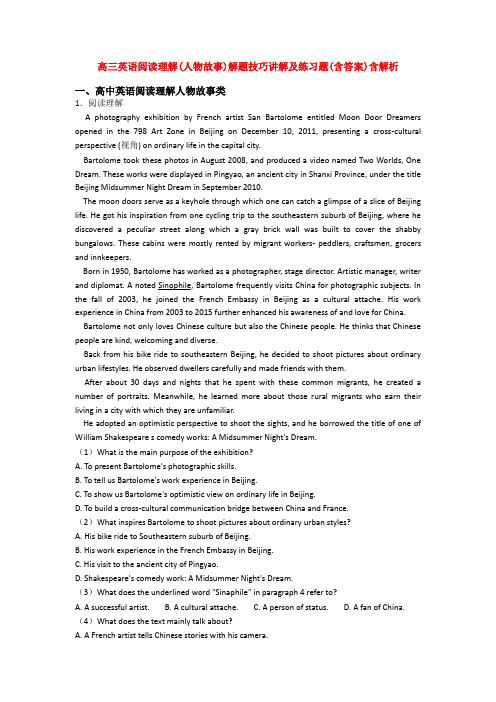
高三英语阅读理解(人物故事)解题技巧讲解及练习题(含答案)含解析一、高中英语阅读理解人物故事类1.阅读理解A photography exhibition by French artist San Bartolome entitled Moon Door Dreamers opened in the 798 Art Zone in Beijing on December 10, 2011, presenting a cross-cultural perspective (视角) on ordinary life in the capital city.Bartolome took these photos in August 2008, and produced a video named Two Worlds, One Dream. These works were displayed in Pingyao, an ancient city in Shanxi Province, under the title Beijing Midsummer Night Dream in September 2010.The moon doors serve as a keyhole through which one can catch a glimpse of a slice of Beijing life. He got his inspiration from one cycling trip to the southeastern suburb of Beijing, where he discovered a peculiar street along which a gray brick wall was built to cover the shabby bungalows. These cabins were mostly rented by migrant workers- peddlers, craftsmen, grocers and innkeepers.Born in 1950, Bartolome has worked as a photographer, stage director. Artistic manager, writer and diplomat. A noted Sinophile, Bartolome frequently visits China for photographic subjects. In the fall of 2003, he joined the French Embassy in Beijing as a cultural attache. His work experience in China from 2003 to 2015 further enhanced his awareness of and love for China.Bartolome not only loves Chinese culture but also the Chinese people. He thinks that Chinese people are kind, welcoming and diverse.Back from his bike ride to southeastern Beijing, he decided to shoot pictures about ordinary urban lifestyles. He observed dwellers carefully and made friends with them.After about 30 days and nights that he spent with these common migrants, he created a number of portraits. Meanwhile, he learned more about those rural migrants who earn their living in a city with which they are unfamiliar.He adopted an optimistic perspective to shoot the sights, and he borrowed the title of one of William Shakespeare s comedy works: A Midsummer Night's Dream.(1)What is the main purpose of the exhibition?A. To present Bartolome's photographic skills.B. To tell us Bartolome's work experience in Beijing.C. To show us Bartolome's optimistic view on ordinary life in Beijing.D. To build a cross-cultural communication bridge between China and France.(2)What inspires Bartolome to shoot pictures about ordinary urban styles?A. His bike ride to Southeastern suburb of Beijing.B. His work experience in the French Embassy in Beijing.C. His visit to the ancient city of Pingyao.D. Shakespeare's comedy work: A Midsummer Night's Dream.(3)What does the underlined word "Sinaphile" in paragraph 4 refer to?A. A successful artist.B. A cultural attache.C. A person of status.D. A fan of China.(4)What does the text mainly talk about?A. A French artist tells Chinese stories with his camera.B. A French artist frequently visits China for photography.C. Migrant workers live a simple but happy life in Beijing.D. Moon Doors serve as a window to display China to the world.【答案】(1)C(2)A(3)D(4)A【解析】【分析】本文是一篇记叙文,法国艺术家圣巴托洛姆在北京798艺术区举办的名为"月亮之门梦想家"的摄影展,从跨文化角度呈现了普通城市的生活以及拍摄的原因。
最新高三英语阅读理解(人物故事)常见题型及答题技巧及练习题(含答案)含解析
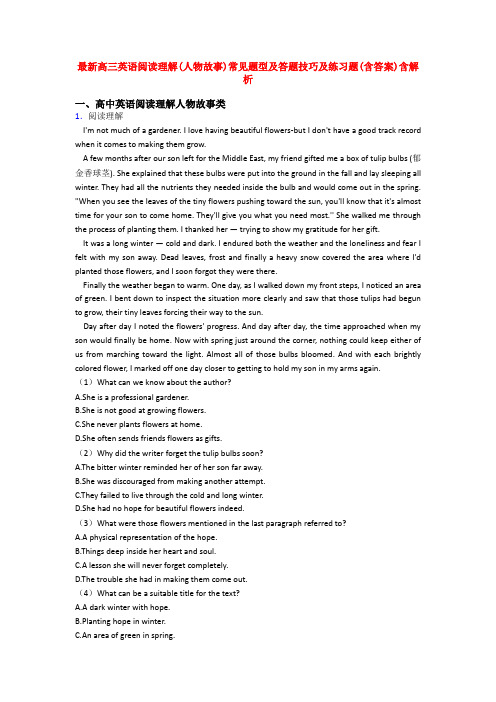
最新高三英语阅读理解(人物故事)常见题型及答题技巧及练习题(含答案)含解析一、高中英语阅读理解人物故事类1.阅读理解I'm not much of a gardener. I love having beautiful flowers-but I don't have a good track record when it comes to making them grow.A few months after our son left for the Middle East, my friend gifted me a box of tulip bulbs (郁金香球茎). She explained that these bulbs were put into the ground in the fall and lay sleeping all winter. They had all the nutrients they needed inside the bulb and would come out in the spring. ''When you see the leaves of the tiny flowers pushing toward the sun, you'll know that it's almost time for your son to come home. They'll give you what you need most.'' She walked me through the process of planting them. I thanked her — trying to show my gratitude for her gift.It was a long winter — cold and dark. I endured both the weather and the loneliness and fear I felt with my son away. Dead leaves, frost and finally a heavy snow covered the area where I'd planted those flowers, and I soon forgot they were there.Finally the weather began to warm. One day, as I walked down my front steps, I noticed an area of green. I bent down to inspect the situation more clearly and saw that those tulips had begun to grow, their tiny leaves forcing their way to the sun.Day after day I noted the flowers' progress. And day after day, the time approached when my son would finally be home. Now with spring just around the corner, nothing could keep either of us from marching toward the light. Almost all of those bulbs bloomed. And with each brightly colored flower, I marked off one day closer to getting to hold my son in my arms again.(1)What can we know about the author?A.She is a professional gardener.B.She is not good at growing flowers.C.She never plants flowers at home.D.She often sends friends flowers as gifts.(2)Why did the writer forget the tulip bulbs soon?A.The bitter winter reminded her of her son far away.B.She was discouraged from making another attempt.C.They failed to live through the cold and long winter.D.She had no hope for beautiful flowers indeed.(3)What were those flowers mentioned in the last paragraph referred to?A.A physical representation of the hope.B.Things deep inside her heart and soul.C.A lesson she will never forget completely.D.The trouble she had in making them come out.(4)What can be a suitable title for the text?A.A dark winter with hope.B.Planting hope in winter.C.An area of green in spring.D.Living a changeable life.【答案】(1)B(2)D(3)A(4)B【解析】【分析】本文是一篇记叙文,作者的儿子去了中东,作者感到孤独和寂寞。
(英语)高三英语阅读理解(人物故事)试题类型及其解题技巧含解析
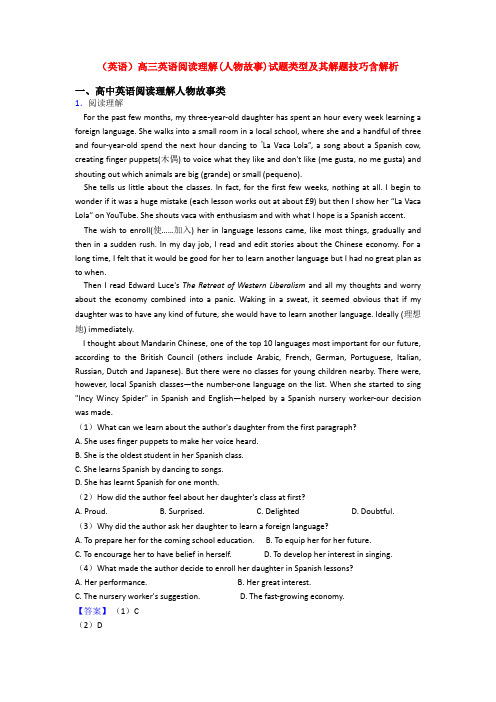
(英语)高三英语阅读理解(人物故事)试题类型及其解题技巧含解析一、高中英语阅读理解人物故事类1.阅读理解For the past few months, my three-year-old daughter has spent an hour every week learning a foreign language. She walks into a small room in a local school, where she and a handful of three and four-year-old spend the next hour dancing to “La Vaca Lola”, a song about a Spanish cow, creating finger puppets(木偶) to voice what they like and don't like (me gusta, no me gusta) and shouting out which animals are big (grande) or small (pequeno).She tells us little about the classes. In fact, for the first few weeks, nothing at all. I begin to wonder if it was a huge mistake (each lesson works out at about £9) but then I show her “La Vaca Lola” on YouTube. She shouts vaca with enthusiasm and with what I hope is a Spanish accent.The wish to enroll(使……加入) her in language lessons came, like most things, gradually and then in a sudden rush. In my day job, I read and edit stories about the Chinese economy. For a long time, I felt that it would be good for her to learn another language but I had no great plan as to when.Then I read Edward Luce's The Retreat of Western Liberalism and all my thoughts and worry about the economy combined into a panic. Waking in a sweat, it seemed obvious that if my daughter was to have any kind of future, she would have to learn another language. Ideally (理想地) immediately.I thought about Mandarin Chinese, one of the top 10 languages most important for our future, according to the British Council (others include Arabic, French, German, Portuguese, Italian, Russian, Dutch and Japanese). But there were no classes for young children nearby. There were, however, local Spanish classes—the number-one language on the list. When she started to sing "Incy Wincy Spider" in Spanish and English—helped by a Spanish nursery worker-our decision was made.(1)What can we learn about the author's daughter from the first paragraph?A. She uses finger puppets to make her voice heard.B. She is the oldest student in her Spanish class.C. She learns Spanish by dancing to songs.D. She has learnt Spanish for one month.(2)How did the author feel about her daughter's class at first?A. Proud.B. Surprised.C. DelightedD. Doubtful.(3)Why did the author ask her daughter to learn a foreign language?A. To prepare her for the coming school education.B. To equip her for her future.C. To encourage her to have belief in herself.D. To develop her interest in singing.(4)What made the author decide to enroll her daughter in Spanish lessons?A. Her performance.B. Her great interest.C. The nursery worker's suggestion.D. The fast-growing economy.【答案】(1)C(2)D(3)B(4)A【解析】【分析】本文是一篇记叙文,作者让自己的女儿学习一种外语的原因以及学习过程中出现的一些问题。
最新高三英语阅读理解(人物故事)(一)解题方法和技巧及练习题及解析

最新高三英语阅读理解(人物故事)(一)解题方法和技巧及练习题及解析一、高中英语阅读理解人物故事类1.阅读理解When I was 12 years old, I already knew that my teen years were going to be the worst years of my life. I was a total outsider, bullied (欺凌) at school. I felt completely alone in my small town.But by starting to do volunteer work when I was 14, I turned my problem into a passion for helping others. The opportunity to practice kindness made me feel like my life had a greater purpose. The more positive energy I shared, the more kindness and appreciation I received. I realized that my purpose in life would be to reach out to people, specifically teenagers, and help them feel less alone.Books were my true friends back then. I was so thankful that the authors wrote those books. The kindness they offered me with their books saved my life. One of my biggest dreams was to become an author so I could write books that would help other teenagers the way those books helped me.After surviving terrible experiences at school and at home, I made a choice to take the optimistic, positive road in the next steps of my journey. My dream career, one I thought was only possible for the authors I loved, is what I am doing now. I have been a full-time author of teen novels since 2007 and am grateful for this amazing opportunity to reach out to readers every single day.Kindness saved me when I needed help the most. Even small acts of kindness can change someone's life. You never know what someone else is going through. But by practicing daily kindness, you become an architect of positive change.(1)What was the author's life like when he was 12?A.Boring.B.Peaceful.C.Unhappy.D.Meaningful.(2)How did the volunteer work benefit the author?A.It made him popular in his town.B.It helped him find the meaning of life.C.It helped him understand others' lives better.D.It helped to shape his dream career.(3)Why did the author choose writing as his job?A.He was inspired by his teacher.B.He could pass positive energy to readers.C.He wanted to share his school experiences.D.He found he had a talent for writing.(4)What does the author suggest readers do in the last paragraph?A.Say 'no' to bullies bravely.B.Make positive changes in their lives.C.Treat others with kindness in daily life.D.Learn to care more about others' feelings.【答案】(1)C(2)B(3)B(4)C【解析】【分析】本文是一篇记叙文,作者讲述了自己参加志愿活动的经历,告诉人们:一次小善举也可能改变一个人的一生。
最新高三英语阅读理解(人物故事)解题技巧分析及练习题(含答案)含解析
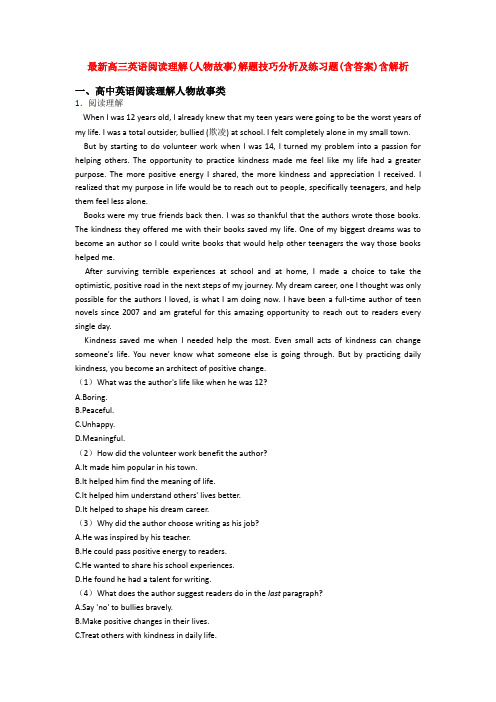
最新高三英语阅读理解(人物故事)解题技巧分析及练习题(含答案)含解析一、高中英语阅读理解人物故事类1.阅读理解When I was 12 years old, I already knew that my teen years were going to be the worst years of my life. I was a total outsider, bullied (欺凌) at school. I felt completely alone in my small town.But by starting to do volunteer work when I was 14, I turned my problem into a passion for helping others. The opportunity to practice kindness made me feel like my life had a greater purpose. The more positive energy I shared, the more kindness and appreciation I received. I realized that my purpose in life would be to reach out to people, specifically teenagers, and help them feel less alone.Books were my true friends back then. I was so thankful that the authors wrote those books. The kindness they offered me with their books saved my life. One of my biggest dreams was to become an author so I could write books that would help other teenagers the way those books helped me.After surviving terrible experiences at school and at home, I made a choice to take the optimistic, positive road in the next steps of my journey. My dream career, one I thought was only possible for the authors I loved, is what I am doing now. I have been a full-time author of teen novels since 2007 and am grateful for this amazing opportunity to reach out to readers every single day.Kindness saved me when I needed help the most. Even small acts of kindness can change someone's life. You never know what someone else is going through. But by practicing daily kindness, you become an architect of positive change.(1)What was the author's life like when he was 12?A.Boring.B.Peaceful.C.Unhappy.D.Meaningful.(2)How did the volunteer work benefit the author?A.It made him popular in his town.B.It helped him find the meaning of life.C.It helped him understand others' lives better.D.It helped to shape his dream career.(3)Why did the author choose writing as his job?A.He was inspired by his teacher.B.He could pass positive energy to readers.C.He wanted to share his school experiences.D.He found he had a talent for writing.(4)What does the author suggest readers do in the last paragraph?A.Say 'no' to bullies bravely.B.Make positive changes in their lives.C.Treat others with kindness in daily life.D.Learn to care more about others' feelings.【答案】(1)C(2)B(3)B(4)C【解析】【分析】本文是一篇记叙文,作者讲述了自己参加志愿活动的经历,告诉人们:一次小善举也可能改变一个人的一生。
高考英语阅读理解(人物故事)试题类型及其解题技巧及解析

高考英语阅读理解(人物故事)试题类型及其解题技巧及解析一、高中英语阅读理解人物故事类1.阅读理解Half a DayI walked alongside my father, holding his right hand. All my clothes were new: the black shoes, the green school uniform, and the red cap. They did not make me happy, however, as this was the day I was to be thrown into school for the first time."Why school?" I asked my father. "What have I done?""I'm not punishing you," he said, laughing. "School's not a punishment. It's a place that makes useful men out of boys. Don't you want to be useful like your brothers?"I was not convinced. I did not believe there was really any good to be had in tearing me away from my home and throwing me into the huge, high-walled building.When we arrived at the gate we could see the courtyard, vast and full of boys and girls. "Go in by you," said my father, "and join them. Put a smile on your face and be a good example to others."I hesitated and squeezed his hand firmly, but he gently pushed me from him. "Be a man", he said. "Today you truly begin life. You will find me waiting for you when it's time to leave."I took a few steps. Then the faces of the boys and girls came into view. I did not know a single one of them, and none of them knew me. I felt I was a stranger who had lost his way. But then some boys began to glance at me in curiosity, and one of them came over and asked, "Who brought you?""My father," I whispered."My father's dead," he said simply.I did not know what to say. The gate was now closed. Some of the children burst into tears. The bell rang. A lady came along and said, "This is your new home. There are mothers and fathers here, too. Everything that is enjoyable and beneficial is here. So dry your tears and face life joyfully."Well, it seemed that my misgivings had had no basis. From the first moments I made many friends. I had never imagined school would have this rich variety of experiences.(1)On the way to school, the boy felt .A. happyB. embarrassedC. upsetD. excited(2)About schooling, Father suggested .A. wearing a smileB. tearing himself away from gamesC. waiting for parentsD. throwing himself to studying(3) helped him most on the first day at school.A. Teachers and classmatesB. Courtyards and buildingsC. Father and brotherD. New uniforms and shoes(4)What would probably happen next?A. The school life would turn out to be a failure.B. Boys in the school would watch him curiously.C. He would open up a new journey of colorful life.D. His parents would accompany him at the school.【答案】(1)C(2)A(3)A(4)C【解析】【分析】本文是一篇记叙文,作者第一天去学校的时候并不开心,但是等他到了学校之后,他结交了很多朋友,开始了新的生活。
(英语)高三英语阅读理解(人物故事)解题技巧和训练方法及练习题(含答案)及解析

(英语)高三英语阅读理解(人物故事)解题技巧和训练方法及练习题(含答案)及解析一、高中英语阅读理解人物故事类1.阅读理解Three months after Hurricane Katrina in 2005, Rebecca Sell, then 24, a photojournalist for Fredericksburg photographed a New Orleans couple worriedly examining water-spotted photo albums. As she took the photo, something within her clicked. "I told them I could take the ruined pictures, copy them and give them digitally restored (修复) photos," she recalls. Although a bit sceptical, the couple agreed. Rebecca took their photos home, restored them and took them to the couple at their temporary home. "It felt so good to be able to do that for them," says Rebecca. When her editor, Dave Ellis, saw the photo of the couple, he suggested they go back and restore damaged photos for even more people. So in January 2006, with paid time off from the paper, the two set up shop in Pass Christian. After posting a notice in the community newsletter, Rebecca and Dave received 500 photos in four days. For each, the pair took a new digital picture, then used high-tech software to erase water spots and restore colors. It just so happened that a popular website linked to Dave's blog about the experience, and soon Operation Photo Rescue, as it came to be known, had emails from hundreds of volunteers, including photographers and restoration experts, eager to help.Though digital restoration is a painstaking process, mending irreplaceable family pictures means the world to victims like Emily Lancaster, 71, who took out piles of ruined photo albums after Katrina, never thinking the mess could be saved. But she just couldn't bear to part with a few treasured pictures, including a portrait of her father, who had passed away, and a photo of her husband as a boy. Then she heard about Operation Photo Rescue. "I didn't have a whole lot of hope they could fix them, but they did," Emily says. "Almost every day I think about all the pictures I've lost. I'm so happy to have these two."In the five years since Katrina, Operation Photo Rescue has collected thousands of pictures ruined by floods, hurricanes and tornadoes. Volunteers make "copy runs" to disaster areas across the country to gather damaged photos from survivors; operating costs are covered by donations. "It's great to be able to give people some of their history back," says Rebecca. "One person told me that thanks to us, her grandmother got to see her photos again before she passed away. Moments like that remind me why I do this."(1)When Rebecca took the picture of the New Orleans couple, she decided to .A. take them to their temporary homeB. help with their damaged photosC. set up shop in Pass ChristianD. cover Hurricane Katrina(2)From Paragraph 2, we know that Dave and Rebecca .A. quit their jobs in 2006B. inspired volunteers to join themC. spent four days mending the photosD. made their work known in their newspaper (3)How did Emily Lancaster feel when she first heard about Operation Photo Rescue? A. Excited. B. Hopeless. C. Satisfied. D. Sceptical.(4)What is the best title for the passage?A. Surviving HurricanesB. An Act of GenerosityC. Saving MemoriesD. A Lucky Couple【答案】(1)B(2)B(3)D(4)C【解析】【分析】本文是一篇记叙文,摄影记者丽贝卡塞尔和编辑戴夫·埃利斯通过照片修复,他们让很多人丢失的记忆得到恢复,同时,也赢得了人们的肯定。
英语阅读理解(人物故事)试题类型及其解题技巧含解析
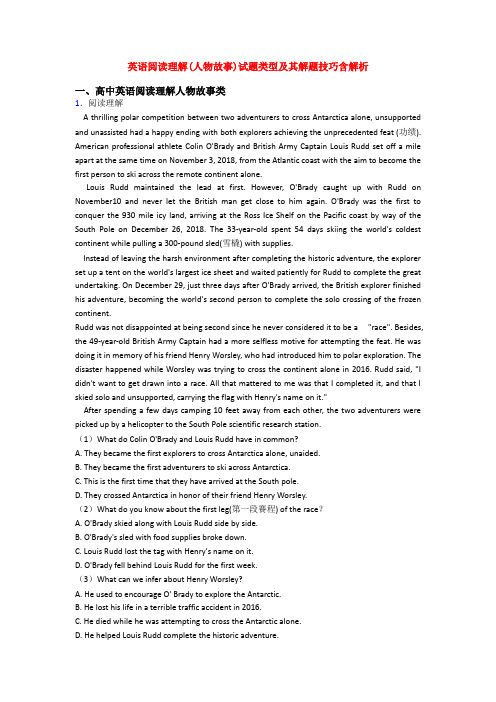
英语阅读理解(人物故事)试题类型及其解题技巧含解析一、高中英语阅读理解人物故事类1.阅读理解A thrilling polar competition between two adventurers to cross Antarctica alone, unsupported and unassisted had a happy ending with both explorers achieving the unprecedented feat (功绩). American professional athlete Colin O'Brady and British Army Captain Louis Rudd set off a mile apart at the same time on November 3, 2018, from the Atlantic coast with the aim to become the first person to ski across the remote continent alone.Louis Rudd maintained the lead at first. However, O'Brady caught up with Rudd on November10 and never let the British man get close to him again. O'Brady was the first to conquer the 930 mile icy land, arriving at the Ross Ice Shelf on the Pacific coast by way of the South Pole on December 26, 2018. The 33-year-old spent 54 days skiing the world's coldest continent while pulling a 300-pound sled(雪橇) with supplies.Instead of leaving the harsh environment after completing the historic adventure, the explorer set up a tent on the world's largest ice sheet and waited patiently for Rudd to complete the great undertaking. On December 29, just three days after O'Brady arrived, the British explorer finished his adventure, becoming the world's second person to complete the solo crossing of the frozen continent.Rudd was not disappointed at being second since he never considered it to be a "race". Besides, the 49-year-old British Army Captain had a more selfless motive for attempting the feat. He was doing it in memory of his friend Henry Worsley, who had introduced him to polar exploration. The disaster happened while Worsley was trying to cross the continent alone in 2016. Rudd said, "I didn't want to get drawn into a race. All that mattered to me was that I completed it, and that I skied solo and unsupported, carrying the flag with Henry's name on it."After spending a few days camping 10 feet away from each other, the two adventurers were picked up by a helicopter to the South Pole scientific research station.(1)What do Colin O'Brady and Louis Rudd have in common?A. They became the first explorers to cross Antarctica alone, unaided.B. They became the first adventurers to ski across Antarctica.C. This is the first time that they have arrived at the South pole.D. They crossed Antarctica in honor of their friend Henry Worsley.(2)What do you know about the first leg(第一段賽程) of the race?A. O'Brady skied along with Louis Rudd side by side.B. O'Brady's sled with food supplies broke down.C. Louis Rudd lost the tag with Henry's name on it.D. O'Brady fell behind Louis Rudd for the first week.(3)What can we infer about Henry Worsley?A. He used to encourage O' Brady to explore the Antarctic.B. He lost his life in a terrible traffic accident in 2016.C. He died while he was attempting to cross the Antarctic alone.D. He helped Louis Rudd complete the historic adventure.(4)How did the two adventurers return to the South Pole scientific research station? A. On foot. B. By air. C. By land. D. By water.【答案】(1)A(2)D(3)C(4)B【解析】【分析】本文是一篇记叙文,两个冒险家在无人帮助的情况下独自滑雪穿越南极大陆,但是两个人的目的不同。
最新高三英语阅读理解(人物故事)常见题型及答题技巧及练习题(含答案)及解析
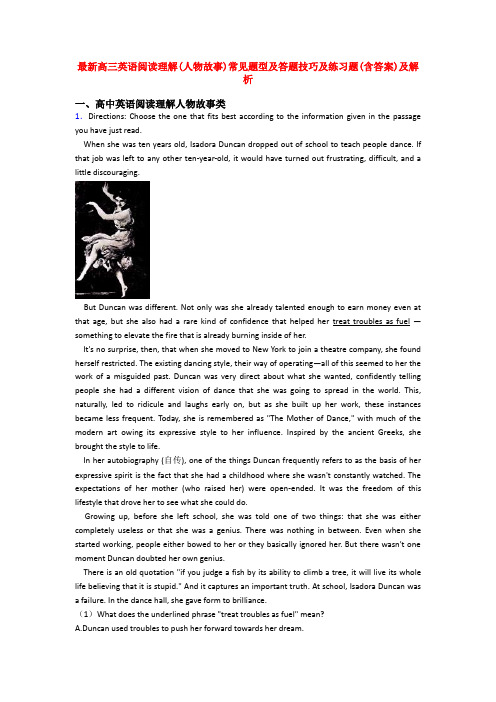
最新高三英语阅读理解(人物故事)常见题型及答题技巧及练习题(含答案)及解析一、高中英语阅读理解人物故事类1.Directions: Choose the one that fits best according to the information given in the passage you have just read.When she was ten years old, Isadora Duncan dropped out of school to teach people dance. If that job was left to any other ten-year-old, it would have turned out frustrating, difficult, and a little discouraging.But Duncan was different. Not only was she already talented enough to earn money even at that age, but she also had a rare kind of confidence that helped her treat troubles as fuel —something to elevate the fire that is already burning inside of her.It's no surprise, then, that when she moved to New York to join a theatre company, she found herself restricted. The existing dancing style, their way of operating—all of this seemed to her the work of a misguided past. Duncan was very direct about what she wanted, confidently telling people she had a different vision of dance that she was going to spread in the world. This, naturally, led to ridicule and laughs early on, but as she built up her work, these instances became less frequent. Today, she is remembered as "The Mother of Dance," with much of the modern art owing its expressive style to her influence. Inspired by the ancient Greeks, she brought the style to life.In her autobiography (自传), one of the things Duncan frequently refers to as the basis of her expressive spirit is the fact that she had a childhood where she wasn't constantly watched. The expectations of her mother (who raised her) were open-ended. It was the freedom of this lifestyle that drove her to see what she could do.Growing up, before she left school, she was told one of two things: that she was either completely useless or that she was a genius. There was nothing in between. Even when she started working, people either bowed to her or they basically ignored her. But there wasn't one moment Duncan doubted her own genius.There is an old quotation "if you judge a fish by its ability to climb a tree, it will live its whole life believing that it is stupid." And it captures an important truth. At school, Isadora Duncan was a failure. In the dance hall, she gave form to brilliance.(1)What does the underlined phrase "treat troubles as fuel" mean?A.Duncan used troubles to push her forward towards her dream.B.Duncan was good at burning away everyday troubles.C.Troubles turned Duncan into a confident girl.D.Troubles lit the fire of dancing in Duncan.(2)Which of the following is TRUE about Duncan?A.Her experience in New York was the foundation of her career.B.Her teaching job when she was little destroyed her confidence.C.Her dancing style was not very well received at the beginning.D.Her mother set higher expectation on her than she could bear.(3)What does the author try to tell the readers in the last paragraph?A.It is useless climbing a tree to catch fish.B.Everybody is a genius in his own way.C.Miseries come from human stupidity.D.Teachers can impact students greatly.(4)What is this passage mainly about?A.Isadora Duncan's childhood and her achievements today.B.Duncan's career development and other dancers' opinions of her.C.Isadora Duncan's early experiences and the reasons for her success.D.Duncan's high status in the dancing world and her unique expressive style.【答案】(1)A(2)C(3)B(4)C【解析】【分析】本文是一篇记叙文,伊莎多拉·邓肯十岁时辍学去教别人跳舞,作者讲述了她的早期的经历以及其取得成功的原因。
高三英语阅读理解(人物故事)试题类型及其解题技巧及解析
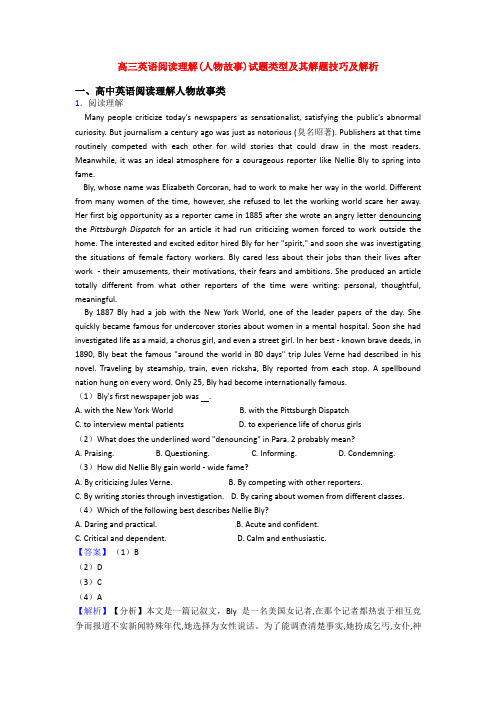
高三英语阅读理解(人物故事)试题类型及其解题技巧及解析一、高中英语阅读理解人物故事类1.阅读理解Many people criticize today's newspapers as sensationalist, satisfying the public's abnormal curiosity. But journalism a century ago was just as notorious (臭名昭著). Publishers at that time routinely competed with each other for wild stories that could draw in the most readers. Meanwhile, it was an ideal atmosphere for a courageous reporter like Nellie Bly to spring into fame.Bly, whose name was Elizabeth Corcoran, had to work to make her way in the world. Different from many women of the time, however, she refused to let the working world scare her away. Her first big opportunity as a reporter came in 1885 after she wrote an angry letter denouncing the Pittsburgh Dispatch for an article it had run criticizing women forced to work outside the home. The interested and excited editor hired Bly for her "spirit," and soon she was investigating the situations of female factory workers. Bly cared less about their jobs than their lives after work - their amusements, their motivations, their fears and ambitions. She produced an article totally different from what other reporters of the time were writing: personal, thoughtful, meaningful.By 1887 Bly had a job with the New York World, one of the leader papers of the day. She quickly became famous for undercover stories about women in a mental hospital. Soon she had investigated life as a maid, a chorus girl, and even a street girl. In her best - known brave deeds, in 1890, Bly beat the famous "around the world in 80 days" trip Jules Verne had described in his novel. Traveling by steamship, train, even ricksha, Bly reported from each stop. A spellbound nation hung on every word. Only 25, Bly had become internationally famous.(1)Bly's first newspaper job was .A. with the New York WorldB. with the Pittsburgh DispatchC. to interview mental patientsD. to experience life of chorus girls(2)What does the underlined word "denouncing" in Para. 2 probably mean?A. Praising.B. Questioning.C. Informing.D. Condemning.(3)How did Nellie Bly gain world - wide fame?A. By criticizing Jules Verne.B. By competing with other reporters.C. By writing stories through investigation.D. By caring about women from different classes.(4)Which of the following best describes Nellie Bly?A. Daring and practical.B. Acute and confident.C. Critical and dependent.D. Calm and enthusiastic.【答案】(1)B(2)D(3)C(4)A【解析】【分析】本文是一篇记叙文,Bly是一名美国女记者,在那个记者都热衷于相互竞争而报道不实新闻特殊年代,她选择为女性说话。
最新高考英语阅读理解(人物故事)试题类型及其解题技巧含解析
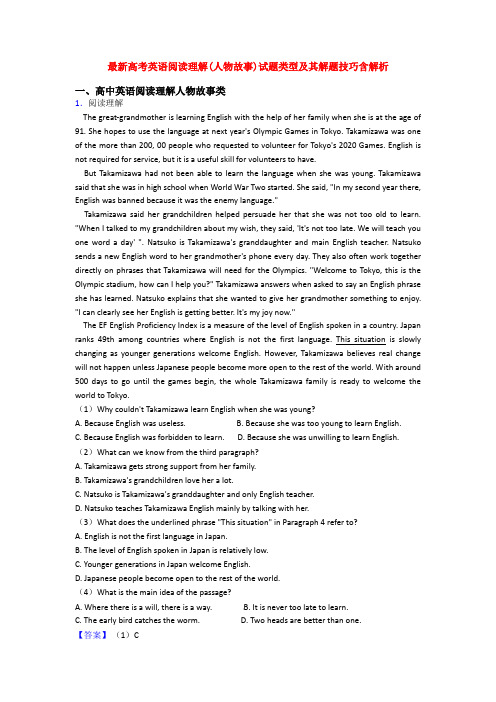
最新高考英语阅读理解(人物故事)试题类型及其解题技巧含解析一、高中英语阅读理解人物故事类1.阅读理解The great-grandmother is learning English with the help of her family when she is at the age of 91. She hopes to use the language at next year's Olympic Games in Tokyo. Takamizawa was one of the more than 200, 00 people who requested to volunteer for Tokyo's 2020 Games. English is not required for service, but it is a useful skill for volunteers to have.But Takamizawa had not been able to learn the language when she was young. Takamizawa said that she was in high school when World War Two started. She said, "In my second year there, English was banned because it was the enemy language."Takamizawa said her grandchildren helped persuade her that she was not too old to learn. "When I talked to my grandchildren about my wish, they said, 'It's not too late. We will teach you one word a day' ". Natsuko is Takamizawa's granddaughter and main English teacher. Natsuko sends a new English word to her grandmother's phone every day. They also often work together directly on phrases that Takamizawa will need for the Olympics. "Welcome to Tokyo, this is the Olympic stadium, how can I help you?" Takamizawa answers when asked to say an English phrase she has learned. Natsuko explains that she wanted to give her grandmother something to enjoy. "I can clearly see her English is getting better. It's my joy now."The EF English Proficiency Index is a measure of the level of English spoken in a country. Japan ranks 49th among countries where English is not the first language. This situation is slowly changing as younger generations welcome English. However, Takamizawa believes real change will not happen unless Japanese people become more open to the rest of the world. With around 500 days to go until the games begin, the whole Takamizawa family is ready to welcome the world to Tokyo.(1)Why couldn't Takamizawa learn English when she was young?A. Because English was useless.B. Because she was too young to learn English.C. Because English was forbidden to learn.D. Because she was unwilling to learn English.(2)What can we know from the third paragraph?A. Takamizawa gets strong support from her family.B. Takamizawa's grandchildren love her a lot.C. Natsuko is Takamizawa's granddaughter and only English teacher.D. Natsuko teaches Takamizawa English mainly by talking with her.(3)What does the underlined phrase "This situation" in Paragraph 4 refer to?A. English is not the first language in Japan.B. The level of English spoken in Japan is relatively low.C. Younger generations in Japan welcome English.D. Japanese people become open to the rest of the world.(4)What is the main idea of the passage?A. Where there is a will, there is a way.B. It is never too late to learn.C. The early bird catches the worm.D. Two heads are better than one.【答案】(1)C(2)A(3)B(4)B【解析】【分析】本文是一篇记叙文,日本91岁的奶奶Takamizawa为了做好迎接在东京举行的2020奥运会的志愿工作,在孙辈的鼓励和帮助下开始学习英语。
最新高三英语阅读理解(人物故事)解题技巧讲解及练习题(含答案)及解析

最新高三英语阅读理解(人物故事)解题技巧讲解及练习题(含答案)及解析一、高中英语阅读理解人物故事类1.阅读下列短文,从每题所给的A、B、C和D四个选项中,选出最佳选项。
Friends always ask why I, a middle-aged woman with no athletic talent, travel to perilous places—the jungles of Thailand or Borneo, for example, where the water is often unsafe and the food risky; places with infectious diseases, poisonous snakes and the wildest animals; some places where the locals are just a few generations past headhunting.I never know how to answer. My travel decisions assumed a new gravity nine years ago after I suffered a stroke. To prevent another stroke, my doctors told me, I'd have to take dangerously high levels of blood thinner (血液稀释剂) for the rest of my life and any travel would be risky.I had to think about what was important to me: family, of course, and friends. But then what? No matter how many times I thought about it, no bucket list was complete without travel. Then I had to decide how I might manage the risk. I had to decide how lucky I felt.My return to travel after my stroke came in baby steps. The first real test of my travel courage came nine months after my stroke when I joined my husband, Jack, on a business trip to China. After we'd toured the remains of a Tang dynasty temple on a high mountain, Jack wanted to ride down on a toboggan (长雪橇).Before the stroke it would've seemed like fun. But now? I hesitated. My mental klaxon (高音喇叭) screamed warnings about the consequences of a cut, a fall, and a crash. Then, gaining confidence from who knows where, I lowered myself carefully into the toboggan, which marked my adventure travel comeback.In the years since then, I've traveled about twenty-five percent of the time. Through it all, my lucks held out—no deadly falls, no car accidents or serious infections. For me, adventure travel is a risk worth taking. Travel broadens my world and keeps me connected to nature. What's more, saying "yes" to travel keeps me connected to myself.(1)What does the underlined word "perilous" in Paragraph 1 probably mean?A. Unique.B. Dangerous.C. Historical.D. Famous.(2)What did the doctors advise the author to do?A. Do proper exercise.B. Enjoy the rest of her life.C. Keep away from traveling.D. Spend more time with her family.(3)Why did the author mention her travel to China?A. It was her last adventure.B. She recovered her courage through it.C. She liked the beautiful scenery in China.D. It was the most dangerous experience in her life.(4)What is the best title for the text?A. A business trip to ChinaB. Unique travel experiencesC. Why I still travel to the wildD. How I overcame the fear of disease【答案】(1)B(2)C(3)B(4)C【解析】【分析】本文是一篇记叙文。
- 1、下载文档前请自行甄别文档内容的完整性,平台不提供额外的编辑、内容补充、找答案等附加服务。
- 2、"仅部分预览"的文档,不可在线预览部分如存在完整性等问题,可反馈申请退款(可完整预览的文档不适用该条件!)。
- 3、如文档侵犯您的权益,请联系客服反馈,我们会尽快为您处理(人工客服工作时间:9:00-18:30)。
最新高三英语阅读理解(人物故事)试题类型及其解题技巧及解析一、高中英语阅读理解人物故事类1.阅读理解When I was 12 years old, I already knew that my teen years were going to be the worst years of my life. I was a total outsider, bullied (欺凌) at school. I felt completely alone in my small town.But by starting to do volunteer work when I was 14, I turned my problem into a passion for helping others. The opportunity to practice kindness made me feel like my life had a greater purpose. The more positive energy I shared, the more kindness and appreciation I received. I realized that my purpose in life would be to reach out to people, specifically teenagers, and help them feel less alone.Books were my true friends back then. I was so thankful that the authors wrote those books. The kindness they offered me with their books saved my life. One of my biggest dreams was to become an author so I could write books that would help other teenagers the way those books helped me.After surviving terrible experiences at school and at home, I made a choice to take the optimistic, positive road in the next steps of my journey. My dream career, one I thought was only possible for the authors I loved, is what I am doing now. I have been a full-time author of teen novels since 2007 and am grateful for this amazing opportunity to reach out to readers every single day.Kindness saved me when I needed help the most. Even small acts of kindness can change someone's life. You never know what someone else is going through. But by practicing daily kindness, you become an architect of positive change.(1)What was the author's life like when he was 12?A.Boring.B.Peaceful.C.Unhappy.D.Meaningful.(2)How did the volunteer work benefit the author?A.It made him popular in his town.B.It helped him find the meaning of life.C.It helped him understand others' lives better.D.It helped to shape his dream career.(3)Why did the author choose writing as his job?A.He was inspired by his teacher.B.He could pass positive energy to readers.C.He wanted to share his school experiences.D.He found he had a talent for writing.(4)What does the author suggest readers do in the last paragraph?A.Say 'no' to bullies bravely.B.Make positive changes in their lives.C.Treat others with kindness in daily life.D.Learn to care more about others' feelings.【答案】(1)C(2)B(3)B(4)C【解析】【分析】本文是一篇记叙文,作者讲述了自己参加志愿活动的经历,告诉人们:一次小善举也可能改变一个人的一生。
(1)考查推理判断。
根据第一段中的“When I was 12 years old, I already knew that my teen years were going to be the worst years of my life.”可知,十二岁时,“我”就意识到青少年时期是“我”一生中最糟糕的阶段;以及“I was a total outsider, bullied at school”,“我”觉得自己是局外人,说明此时的生活是不如意的。
故选C。
(2)考查推理判断。
根据第二段中的“But by starting to do volunteer work when I was 14, I turned my problem into a passion for helping others. The opportunity to practice kindness in the face of so much anger made me feel like my life had a greater purpose.”可知,但是在我14岁的时候开始做志愿者工作,我把我的问题变成了帮助别人的热情。
面对如此多的愤怒,我有机会实践仁慈,这让我觉得我的生活有一个更大的目标。
因此推断参加志愿活动给“我”提供了表达善意的机会,让“我”感觉到生活有更大的意义。
故选B。
(3)考查细节理解。
根据第三段中的“The kindness they offered me with thei r books saved my life. One of my biggest dreams was to become an author so I could write books that would help other teenagers the way those books helped me.”可知,书中作者的善意拯救了“我”的生活,“我”最大的梦想就是成为一名作家,可以写书去帮助其他的青少年,把善意传递给他们。
故选B。
(4)考查推理判断。
根据最后一段中的“Even small ac ts of kindness can change someone's life. You never know what someone else is going through. But by practicing daily kindness, you become an architect of positive change.”可知,作者在提醒我们注意善意的力量,一次小善举也可能改变一个人的一生,平时以善意待人,会让人们成为积极改变的缔造者。
故选C。
【点评】本题考点涉及细节理解和推理判断两个题型的考查,是一篇故事类阅读,考生需要准确捕捉细节信息,并根据上下文进行逻辑推理,从而选出正确答案。
2.阅读理解Half a DayI walked alongside my father, holding his right hand. All my clothes were new: the black shoes, the green school uniform, and the red cap. They did not make me happy, however, as this was the day I was to be thrown into school for the first time."Why school?" I asked my father. "What have I done?""I'm not punishing you," he said, laughing. "School's not a punishment. It's a place that makes useful men out of boys. Don't you want to be useful like your brothers?"I was not convinced. I did not believe there was really any good to be had in tearing me away from my home and throwing me into the huge, high-walled building.When we arrived at the gate we could see the courtyard, vast and full of boys and girls. "Go inby you," said my father, "and join them. Put a smile on your face and be a good example to others."I hesitated and squeezed his hand firmly, but he gently pushed me from him. "Be a man", he said. "Today you truly begin life. You will find me waiting for you when it's time to leave."I took a few steps. Then the faces of the boys and girls came into view. I did not know a single one of them, and none of them knew me. I felt I was a stranger who had lost his way. But then some boys began to glance at me in curiosity, and one of them came over and asked, "Who brought you?""My father," I whispered."My father's dead," he said simply.I did not know what to say. The gate was now closed. Some of the children burst into tears. The bell rang. A lady came along and said, "This is your new home. There are mothers and fathers here, too. Everything that is enjoyable and beneficial is here. So dry your tears and face life joyfully."Well, it seemed that my misgivings had had no basis. From the first moments I made many friends. I had never imagined school would have this rich variety of experiences.(1)On the way to school, the boy felt .A. happyB. embarrassedC. upsetD. excited(2)About schooling, Father suggested .A. wearing a smileB. tearing himself away from gamesC. waiting for parentsD. throwing himself to studying(3) helped him most on the first day at school.A. Teachers and classmatesB. Courtyards and buildingsC. Father and brotherD. New uniforms and shoes(4)What would probably happen next?A. The school life would turn out to be a failure.B. Boys in the school would watch him curiously.C. He would open up a new journey of colorful life.D. His parents would accompany him at the school.【答案】(1)C(2)A(3)A(4)C【解析】【分析】本文是一篇记叙文,作者第一天去学校的时候并不开心,但是等他到了学校之后,他结交了很多朋友,开始了新的生活。
